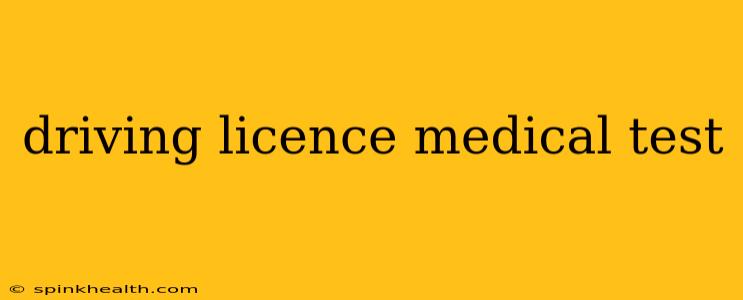Getting your driver's license is a rite of passage for many, symbolizing freedom and independence. But before you can hit the open road, you'll likely need to pass a medical test. This isn't just a formality; it's a crucial step to ensure you're physically and mentally capable of driving safely. This comprehensive guide will delve into the intricacies of the driving licence medical test, addressing common questions and concerns.
Imagine this: you've spent months learning the rules of the road, mastering parallel parking, and perfecting your three-point turn. The driving test is looming, and you're feeling confident. But then you realize there's another hurdle – the medical examination. This seemingly small step can be a source of anxiety for some, but understanding the process can significantly alleviate those worries.
What is a Driving Licence Medical Test?
The driving licence medical test is a health assessment designed to determine if you're fit to drive safely. The specific requirements vary depending on your location, age, and the type of driving licence you're applying for (e.g., car, motorcycle, commercial vehicle). Generally, it involves a check of your vision, hearing, and general health. The goal is to identify any conditions that might impair your ability to operate a vehicle safely and responsibly. Think of it as a safety net for both you and other road users.
What Happens During the Medical Examination?
The exact procedures can vary, but generally, expect the following:
-
Vision Test: This is a crucial part of the examination. Expect to be tested for visual acuity (sharpness of vision), visual field (peripheral vision), and possibly color blindness.
-
Hearing Test: Your hearing will be assessed to ensure you can hear approaching vehicles and emergency sirens.
-
General Health Check: This might include questions about your medical history, current medications, and any pre-existing conditions. Your doctor may also perform a brief physical examination.
-
Specific Tests: Depending on your age, driving licence type, or any disclosed health conditions, additional tests may be required. This could include blood pressure checks, neurological assessments, or even specialist referrals.
What Medical Conditions Might Affect My Ability to Drive?
Several medical conditions can impact driving ability. These include, but aren't limited to:
-
Epilepsy: Uncontrolled seizures are a significant risk.
-
Diabetes: Poorly managed diabetes can lead to hypoglycemic episodes, affecting concentration and awareness.
-
Heart Conditions: Certain heart conditions can cause sudden incapacitation.
-
Vision Impairments: Significant visual impairments can make driving unsafe.
-
Mental Health Conditions: Conditions like severe anxiety or depression can affect judgment and reaction times.
It's crucial to be completely honest with your doctor about your medical history. Withholding information could jeopardize your safety and the safety of others.
How Often Do I Need a Driving Licence Medical Test?
The frequency of medical tests varies depending on your age and location. Younger drivers generally only need one initial test, while older drivers may require more frequent check-ups. Always check with your local Driver and Vehicle Licensing Agency (DVLA) or equivalent for specific requirements in your region.
What if I Have a Pre-Existing Medical Condition?
Don't panic if you have a pre-existing medical condition. Many people with health conditions can still drive safely with appropriate management. Openly discuss your condition with your doctor during the examination; they can assess your fitness to drive and recommend any necessary accommodations or further investigations.
Can I Choose My Own Doctor for the Medical Examination?
In many cases, you can choose your own doctor. However, you might need to use a doctor approved by your local Driver and Vehicle Licensing Agency. Check the specific regulations in your area to ensure compliance.
What Happens if I Fail the Medical Test?
If you fail the medical test, don't despair. You might be able to appeal the decision or explore options for managing your condition to meet the required driving standards. Your doctor can advise you on the best course of action. Remember, this is about ensuring your safety and the safety of others on the road.
This guide provides a general overview. Always consult your local Driver and Vehicle Licensing Agency or equivalent for specific requirements and regulations in your region. Remember, the driving licence medical test is a vital part of ensuring road safety, and honesty and transparency are key to a successful outcome.

